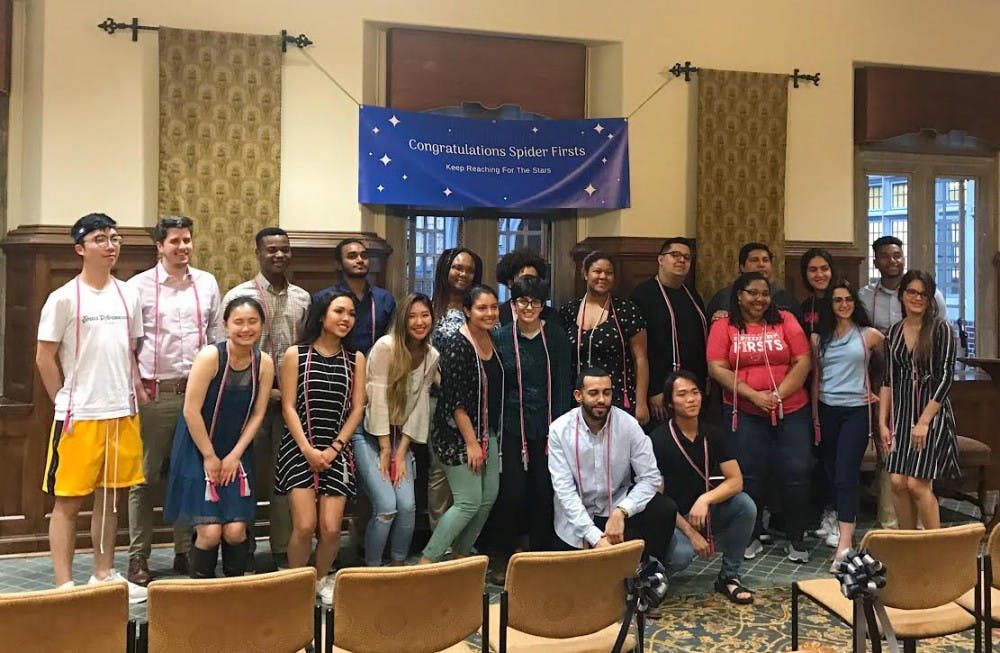On May 12 at commencement, first-generation college students in the Spider Firsts program will not only be celebrating their degree acceptances, but they will also be honoring their achievement of a family milestone.
First-generation graduates of the class of 2019 gathered in the Brown Alley Room on April 8, where they received rose and silver cords that they will wear during commencement to physically represent their unique identity. This marks the second time in UR history that first-generation students receive these cords, given that the tradition began last year.
15% of the University of Richmond’s population is first-generation, said Lisa Miles, associate director in the Office of Common Ground.
“We want to help students claim this identity,” she said.
Miles created the Spider Firsts program five years ago because she recognized that the first generation identity was not a part of the everyday language on campus. She knew that bringing students with a common identity together would help them succeed throughout college, a life-changing process that they have never been able to ask their parents about, she said.
The inclusivity and consistency of this program make it remarkable, said Aaron D’Oleo, a first-generation senior, citing the emails they get sent about information sessions or community activities to help immerse them in campus life.
The Spider Firsts program helps students navigate college life, manage personal finances, expose them to opportunities on and off campus, offer unofficial mentors and serve as a support group where immediate friendships can be made, Miles and D’Oleo agreed.
The experiences first-generation students have can go unnoticed by other UR community members. Wendy Berrios, a first-generation student and senior, has constantly compared herself to others and knew she was at a natural disadvantage, she said.
“I felt as if I never sounded as smart as other students in class,” Berrios said.
Although the path to a college experience was not easily paved, her parents have made her who she is today even though they did not have the same opportunities, Berrios said. She is proud to be a first-generation graduate, she added.
Other students may not recognize the advantage their parents’ experiences bring to the table, D’Oleo said. Because of those experiences, he said, other students are automatically more motivated to accomplish their goals, such as obtaining an undergraduate degree.
“A goal like that isn’t naturally in our vision,” D’Oleo said.
Enjoy what you're reading?
Signup for our newsletter
What do the cords mean to the first-generation class of 2019?
“Progress and unity,” said Jonathan Rodriguez, a first-generation senior.
D’Oleo echoed this sentiment.
“It is a testament to our hard work,” D’Oleo said. “It is one thing to know you’ve accomplished something, but it’s another to have a tangible reminder of success.”
Since the program has started, Miles has tried to welcome first-generation students prior to their arrival on campus. She writes letters to admitted first-generation students informing them about the program early on.
“We prepare a panel for the parents and socializing time for the students during their first few days on campus,” Miles said.
There are already members from the class of 2023 in the Spider Firsts Facebook group, she said.
A goal Miles has for the future of the Spider Firsts program is to make an official student or faculty mentoring program. The program currently has an unofficial system in which first-generation faculty members or first-generation upperclassmen help other students in the program handle college life through their own experiences.
A list of first-generation faculty and staff is provided on the Office of Common Ground website. Their offices can serve as safe zones for first-generation students, Miles said.
Ronald A. Crutcher, president of UR, is also a first-generation graduate of Miami University in Ohio. Because Crutcher understands the difficulties of being first-generation, he is an active supporter of the Spider Firsts program and attends almost every event, Miles said.
Contact contributor Julia Schmuckler at julia.schmuckler@richmond.edu.
Support independent student media
You can make a tax-deductible donation by clicking the button below, which takes you to our secure PayPal account. The page is set up to receive contributions in whatever amount you designate. We look forward to using the money we raise to further our mission of providing honest and accurate information to students, faculty, staff, alumni and others in the general public.
Donate Now



